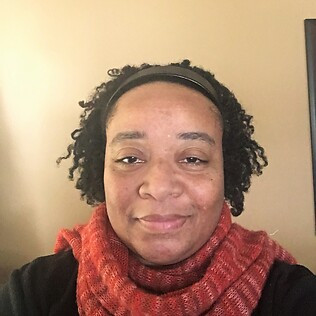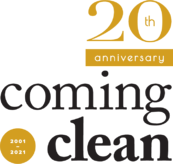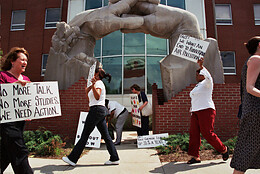March Spotlight: REACT
|
|
Rubbertown Emergency ACTion (REACT)Members: Eboni Cochran, Charles Pope
|
|
|
About Rubbertown Emergency ACTionRubbertown Emergency ACTion (REACT) is a grassroots organization of residents living in neighborhoods adjacent to a cluster of chemical plants commonly referred to as Rubbertown. REACT is fighting for:
|
Our work with the Coming Clean NetworkREACT has been involved with Coming Clean since its early days, when at a Coming Clean strategy meeting in Louisville, Kentucky, REACT and Coming Clean members demonstrated side-by-side to demand state officials listen to the concerns raised by community members in Rubbertown. Since then, the two organizations have collaborated closely on:
|

|
"Because of decades upon decades of chemical assault in our community, people feel hopeless. When we would knock on doors they’d say, “That’s been happening since the 40s or the 50s and nobody is going to do anything about it.” We want to plant that seed so they know we have to keep pushing and pushing. We hope that the community feels more empowered, that the community is more knowledgeable, that the community has access to information. That’s what I hope that we will have contributed."— Eboni Cochran |
What vision of the world are you working towards?
In short the vision is clean air: Air that does not wreak havoc on the health of the people living on this Earth. It’s a vision of healing the earth through better practices, and part of our vision is to connect with other groups who are working on other justice issues, because all of this, in my opinion, boils down to greed. That’s the common denominator between all of the injustices that we experience. Our work is about making sure that what we’re doing leads to future generations -- and current generations -- benefiting from reductions in their exposure to toxic chemicals.
Has there been an accomplishment, or favorite moment, that you want to share?
In 2003, there was a proposed set of regulations called the STAR program. Over 2 years between 2003 and 2005, we sent three people to each Metro Council meeting twice a month -- and those meetings were televised. Coming Clean helped with us drafting our comments about the set of regulations, so we were able to take talking points and give them to people in the community.
I remember walking into Kroger, the grocery store, and the bread guy saying to me “I saw you on TV” and I’m thinking “What? People watch this?”
So we were able to take the expertise of Coming Clean, our passion, our testimonials, true data; and we were able not only to educate Metro Council members, but also community members who watched the meetings.
The STAR program actually was adopted in 2005. We were able to gather almost 4,000 signatures in support of it from the community. The paper reported that was the largest response that any kind of hearing had ever had.
What do you feel are the biggest opportunities right now to enact the kind of change that you’re hoping to see?
With all the protests that happened over the summer I saw new people who became more interested in fighting for justice. That makes me hopeful. It makes me hopeful that their ears are opening, their minds are opening, and they understand that they have a voice and that they can make an impact. I think there’s a huge opportunity there to tap into those new folks.
We are currently working on a health literacy project with one of the council persons on Metro Council and I’m really excited about that. It’s centered around legal notices and how communication is done towards communities so that communities understand that they can participate in processes and hearings. Many times the legal notices are very vague or have very technical language so we’re working on that.
What from your perspective is most important for members of the Coming Clean network to be thinking about?
I think that folks in Coming Clean need to just dig in and stick with this for the long haul. I also think that a focus should be made to train on the ground fenceline residents and organizations so that we can train other community members on information and data that the community can use to fight for environmental justice. I would love that. I love that I feel connected and I can just call a scientist somewhere and ask them a question, but I want that connection to be much deeper. I would love for there to be a core group of Coming Clean scientists and data people who we can just say, “Listen, we have a hearing in 2 weeks. This is what the chemical is about. What can we do?” And that task force hosts a meeting for the organization on the ground and says, “Look these are your options. This is what this means, and these are the tools you can use to fight this.”
"We’ve always felt that we are experts in this Environmental Justice arena, especially of our own experiences. The decision makers early on discredited us, and of course industry did. Even though we still had the confidence that we had a voice -- and we had a valid voice -- what Coming Clean brought to the table was they made us legitimate in the eyes of decision makers, and that took things to the next level."— Eboni Cochran |




